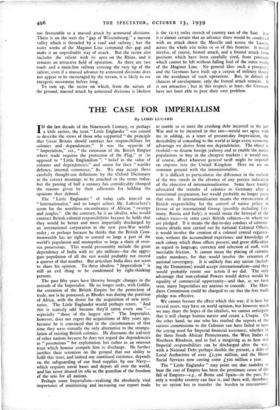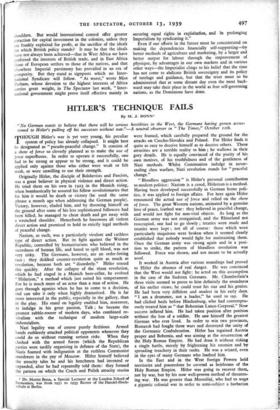THE CASE FOR IMPERIALISM
By LORD LUGARD
Ithe last decade of the Nineteenth Century, or perhaps 1 a little earlier, the term " Little Englander " was coined to describe the views of those who supported " the principle that Great Britain should contract her responsibilities for colonies and dependencies." It was the opposite of " Imperialism," viz., " the extension of the British Empire where trade requires the protection of the Flag," or (as opposed to " Little Englandism ") " belief in the value of colonies and dependencies," and union for their " warlike defence, internal commerce," &c. We may accept these carefully thought-out definitions by the Oxford Dictionary as the correct meanings to be attached to the terms today, but the passing of half a century has considerably changed the reasons given by their adherents for holding the opinions thus defined.
The " Little Englander " of today calls himself an " Internationalist," and no longer echoes Mr. Labouchere's scorn for the worthless encumbrance of African " swamps and jungles." On the contrary, he is an idealist, who would contract British colonial responsibilities because he holds that they would be better and more impartially discharged by an international corporation in the new post-War world- order ; or perhaps because he thinks that the British Com- monwealth has no right to control so large a part of the world's population and monopolise so large a share of over- sea possessions. This would presumably include the great dependency of India with its 36o millions—for the aggre- gate population of all the rest would probably not exceed a quarter of that number. But articulate India does not seem to share his opinion. To these idealists " Imperialism " is still an evil thing to be condemned by right-thinking persons.
The past fifty years have likewise brought.: changes in the attitude of the Imperialist. He no longer seeks, with Goldie, the extension of the British Empire for the protection of trade, nor is he possessed, as Rhodes was during the partition of Africa, with the desire for the acquisition of new terri- tories. The Little Englander would perhaps retort, " And this is scarcely odd because they'd eaten every one "- especially " those of the largest size." The Imperialist, however, does not regret the acquisitions of fifty years ago, because he is convinced that in the circumstances of that time they were virtually the only alternative to the strangu- lation of existing British colonies. He discounts the jealousy of other nations because he does not regard the dependencies as " possessions " for exploitation, but rather as an onerous trust which honour compels him to discharge. He further justifies their retention on the ground that our ability to fulfil this trust, and indeed our continued existence, depends on the safeguarding of our food supplies by our Navy— which requires naval bases and depots all over the world, and has never abused its role as the guardian of the freedom of the seas for all nations.
Perhaps some Imperialists—realising the absolutely vital importance of maintaining and increasing our export trade to enable us to meet the crushing debt incurred in the last War and to be incurred in this one—would not agree with me in adding, as a tenet of present-day imperialism, the . desirability of conceding to the world at large every economic advantage we derive from our dependencies. The object is twofold—to disarm foreign jealousy and to enable the native populations to buy in the cheapest markets ; it would not, of course, affect whatever general tariff might be imposed on imports into the United Kingdom. Here we are on common ground with the internationalists.
It is difficult to particularise the difference in the outlook of the two creeds in the absence of any precise indication of the objective of internationalisation. Some have frankly advocated the transfer of colonies to Germany after a transitional preparation, but would probably no longer press that view. If internationalisation means the renunciation of British responsibility for the control of native policy in favour of an international Group (possibly including Ger- many, Russia and Italy), it would mean the betrayal of the subject races—in some cases British subjects—to whom we are pledged. If it means the day-to-day conduct of adminis. trative details now carried out by national Colonial Offices, it would involve the creation of a colossal central organisa- tion, without the accumulated experience and knowledge of each colony which those offices possess, and great difficulties in regard to language, currency and selection of staff, with inevitable friction. It cannot mean the placing of colonies under mandates, for that would involve the retention of national sovereignty. It is unlikely that any nation (includ- ing the Dominions) would accept internationalism—and they would probably resent our action if we did. The only advantage that non-colonial Powers would derive would be equality of commercial opportunity—and that, as we have seen, many Imperialists are anxious to concede. The Man- dates Commission could be charged to see that the free trade pledge was effective.
We cannot foresee the effect which this war, if it lasts for several years, may have on world opinion, but however much we may share the hopes of the idealists, we cannot anticipate that it will change human nature and create a Utopia. On the other band, no one who has studied the reports of the various commissions to the Colonies can have failed to note the crying need for Imperial financial assistance, whether in the three South African Protectorates, the West Indies or Northern Rhodesia, and to feel a misgiving as to how our Imperial responsibilities can be discharged after the war, with a National Debt perhaps double the present, a debt of Local Authorities of over £1,500 million, and the Home Social Services now costing some £500 million a year.
The " Little Englander " may point out that inability to bear the cost of Empire has been the proximate cause of the fall of Empires—e.g., of Rome and Spain—in the past, for only a wealthy country can face it, and there will, therefore, be no option but to transfer the burden to international shoulders. But would international control offer greater attraction for capital investment in the colonies, unless they are frankly exploited for profit, at the sacrifice of the ideals for which British policy stands? It may be that the ideals nave not always been achieved—that in West Africa we have preferred the interests of British trade, and in East Africa those of European settlers to those of the natives, and that elsewhere Imperial parsimony has prevailed in an era of prosperity. But they stand as signposts which no Inter- national Syndicate will follow. " At worst," wrote Miss Perham, whose devotion to the highest interests of Africa carries great weight, in The Spectator last week, " Inter- national government might prove itself effective mainly in securing equal rights in exploitation, and In prolonging Imperialism by syndicating it."
Even if our efforts in the future must be concentrated on making the dependencies financially self-supporting—by better methods of agriculture and marketing, by a larger and better output for labour through the improvement of physique, by advantages in our own markets and in various other ways—the Imperialist clings to his belief that the time has not come to abdicate British sovereignty and its policy of tutelage and guidance, but that the trust must so be administered that at some distant day even the most back- ward may take their place in the world as free self-governing nations, as the Dominions have done.











































 Previous page
Previous page